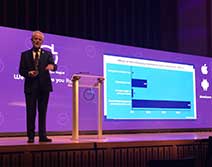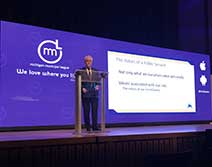 How do you get your audience actively engaged in a discussion of ethics? For Dr. Scott Paine, the answer was simple – ask them to use their smartphones!
How do you get your audience actively engaged in a discussion of ethics? For Dr. Scott Paine, the answer was simple – ask them to use their smartphones!
As part of his presentation, Paine periodically had session attendees answer ethics questions on a special app. Even better, the responses instantly appeared on the huge screen at the front of the Jack H. Miller Center for Musical Arts.
The first question dealt with what ethics is not. Most people correctly responded that it’s not just a matter of personal preference. “It’s not about what’s best for you and it’s not about obeying ethics laws. The law is always behind ethics issues,” said Paine, director of leadership development and education for the Florida League of Cities’ FLC University.
Not only that, but sometimes laws themselves are unethical. He cited laws from the 1950s and 60s that prohibited people of color from sitting at lunch counters.
Once you know what ethics is not, you need to zero in on what it is. Paine defined it broadly as moral principles for living and making decisions as well as the study of what we ought to do.
 He emphasized that ethics should be based on what you value and what is relevant and important to consider. As audience members grabbed their smartphones and started entering their core values, answers like honesty, integrity, respect, and family began to pop up on the screen.
He emphasized that ethics should be based on what you value and what is relevant and important to consider. As audience members grabbed their smartphones and started entering their core values, answers like honesty, integrity, respect, and family began to pop up on the screen.
Then Paine drew a distinction between our personal values and our values as government officials. Public servants have an obligation that citizens don’t have. They have to consider the values of their city, the values associated with their role, the values of their constituents. They have an obligation to value what their community values.
With that in mind, Paine stressed the necessity of inconsistency. Public servants need to adopt codes of ethical conduct that reflect their roles, not just their personal values. In this sense, consistency between one’s conduct as a public official and one’s private conduct may not be a virtue.

